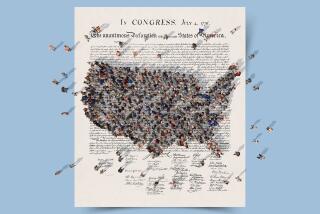A Document That Evolves With America
- Share via
PHILADELPHIA — If the Founding Fathers had suddenly been dropped into the leaden, muggy and rainy 200th anniversary celebration of the signing of the Constitution, some of their worst apprehensions would have no doubt been fulfilled.
Independence Hall, whose steeple once towered over untrammeled vistas symbolic of a society that was the world’s most egalitarian and open, has been encroached on and circumscribed by the fading buildings of America’s 19th- and early 20th-Century industrial era and the glass and steel skyscrapers of post-World War II high-tech affluence, manifestations of the kind of opulent luxury that 18th-Century Americans scorned. Where Benjamin Franklin hosted tea under a mulberry tree, hordes of blue-uniformed police patrol behind barricades. Metal detectors bar the way. The FBI and the Secret Service hug their walkie-talkies and survey from rooftops, and helicopters watch over all.
In place of the demotic grass-roots celebration that followed the Constitution’s ratification in 1788, with more than half of Philadelphia’s 30,000 population in attendance and 5,000 participants in the parade, we have a Radio City Music Hall production--professional, regimented and artificial.
It is a far cry from 200 years ago when delegates like George Washington, Benjamin Franklin, James Madison, George Mason, Alexander Hamilton and Elbridge Gerry lived simply and sweltered through the summer to produce a document as viable today as it was then.
Practical men, not utopians or theoreticians, they were driven by intense motivation. Having experienced and examined the evils perpetrated by governments in the past, they tried to anticipate the potential abuses in the future. When they erred, it was on the side of prudence. The Constitution is a document of caution, not efficiency. The Founders tried to ensure that power was so diffuse that it did not corrupt.
Though the sentiment that power should be based in the people prevailed--hence the House of Representatives, elected by a popular vote--prudence dictated that this should be counterbalanced by property interest--therefore the Senate, elected (originally) by the state legislatures. The Senate and the executive were to check each other. The judiciary was quite consciously envisioned by the Founders as the guardian of the Constitution against excesses by either of the other branches.
What emerged, then, was more of a framework and a statement of principles than a devotion to specifics. The Founders would have no difficulty recognizing the institution of Congress, left free to develop its own rules and change them as suited its purpose. And while a powerful executive is a development at which the members of the Constitutional Convention would undoubtedly be appalled, the structure can accommodate this, too. The checks remain to ensure the balance.
It was primarily the apprehension of excess executive power that motivated Thomas Jefferson and Patrick Henry, the foremost spirits of the American Revolution, to press for the enactment of a Bill of Rights.
The Bill of Rights is essentially a statement of three broad principles. Amendments 3 and 4 assure the security of property and imply the right to privacy. Amendments 5 through 8 offer protection against the inquisitorial procedures implied by both governments and religions--often in concert. Amendment 1 is a specification of “inalienable” republican rights, freedom of religion, speech, the press and assembly. Amendments 9 and 10 essentially reinforce the First Amendment in that they specifically reserve to the people rights not enumerated in the Constitution.
The question today, as it has always been, is whether we will continue with an evolutionary Constitution based on broad principles. The Founders could hardly deal with public schools, since these did not come into existence until more than 40 years later. But, having witnessed religious bigotry and bickering, they did enunciate the principle that government would not involve itself in the practice of religion, or its non-practice.
No more could they apply themselves, a century before the dawn of modern medicine or the practice of contraception, to a woman’s right to control her reproductive capacity. But, given their commitment to individual liberty and their specific declaration that the rights not enumerated in the Constitution are retained by the people and the state, they would surely view any attempt at government regulation of personal life and individual choice as an infringement.
George Mason warned against the tyranny of the majority, which he viewed as a natural dynamic that man must ever be on guard against. If the 200th anniversary of the Constitution is to have meaning beyond the hoopla, it should be a recognition that the Constitution has persisted as an eloquent instrument precisely because its broad principles accommodate changing times, and it is not to be used to impose the standards of one segment of the population on another.
More to Read
Get the L.A. Times Politics newsletter
Deeply reported insights into legislation, politics and policy from Sacramento, Washington and beyond. In your inbox twice per week.
You may occasionally receive promotional content from the Los Angeles Times.










